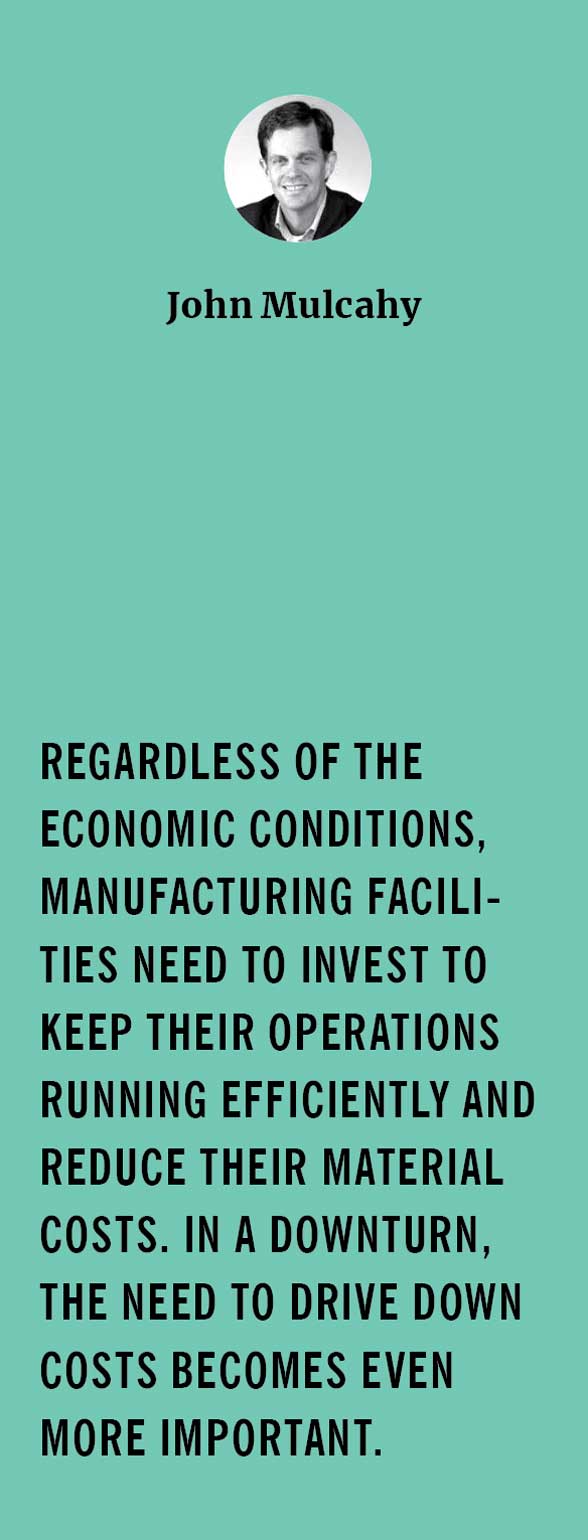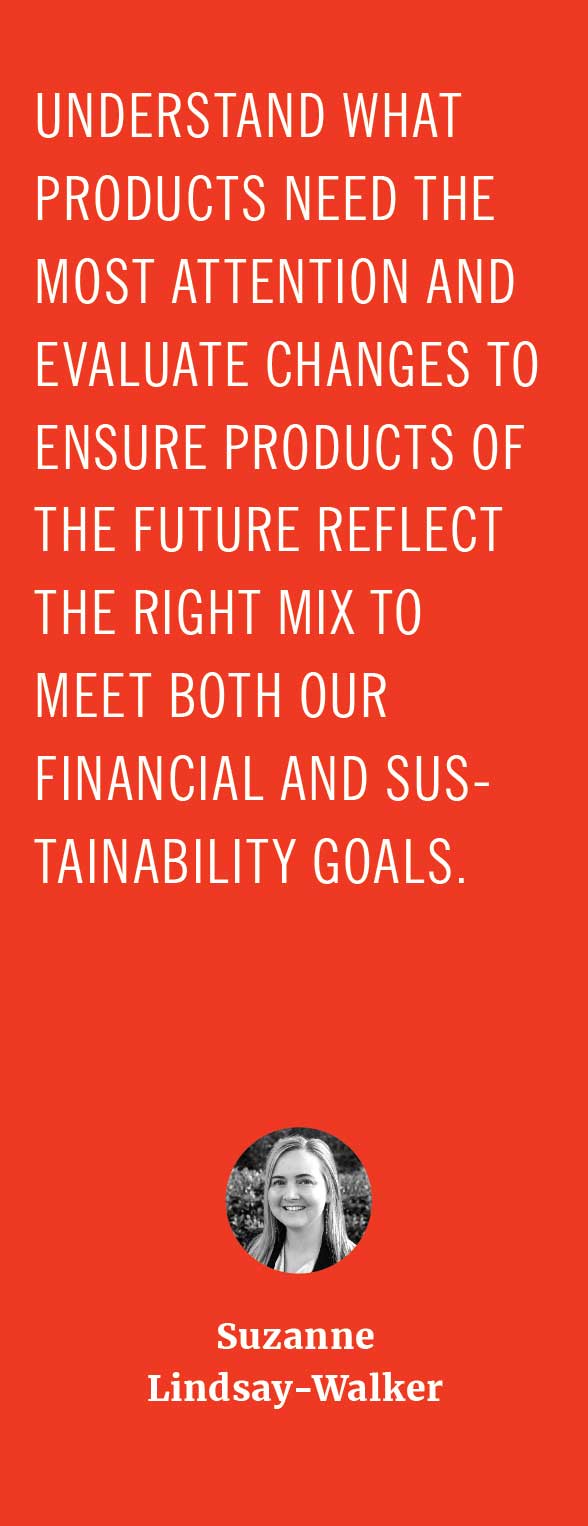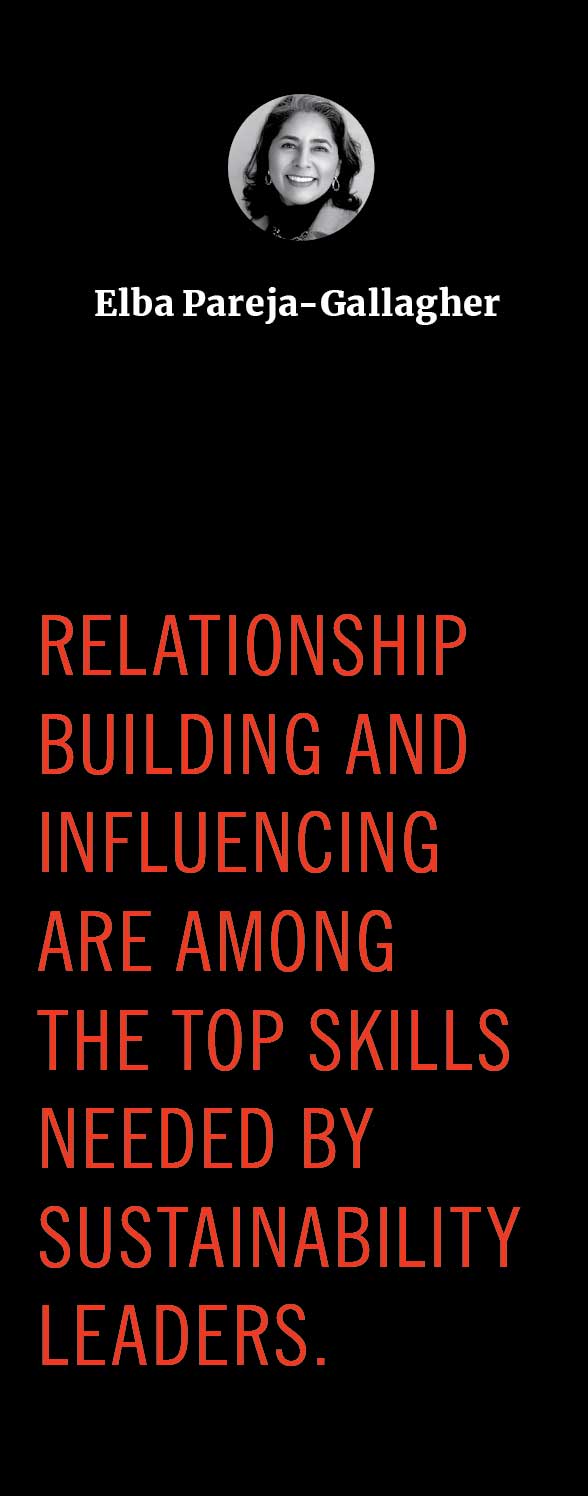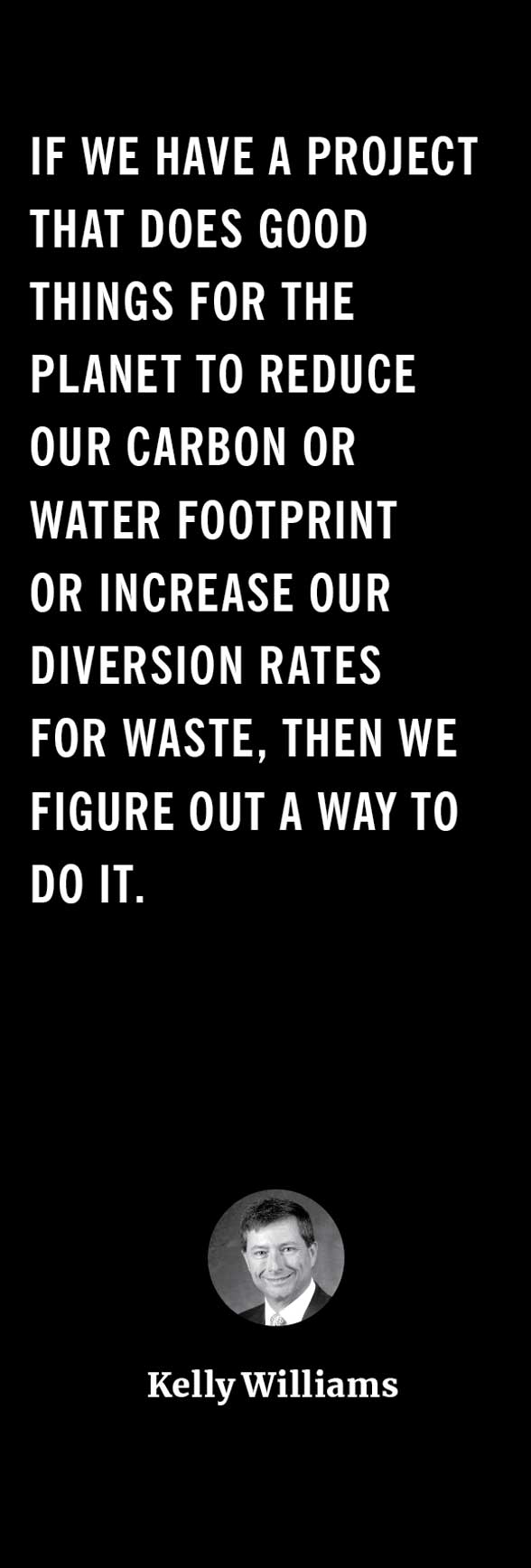Given increased pressure from stakeholders, operational challenges caused by natural disasters and supply chain disruptions, and the proposed Securities and Exchange Commission (SEC) climate disclosure regulations coming soon, there is no question as to why environmental sustainability and ESG (environmental, social and governance) are a focus of corporate leaders and a topic in the boardroom.
But in a year riddled with layoffs and cost cutting across many industries, how are leading organizations maintaining a focus on sustainability? We interviewed five corporate sustainability leaders to get their perspective.
MEET
THE SUSTAINABILITY
LEADERS
Paige Goff

Company: DOMTAR
Industry: Forest products (pulp and paper)
Role: Vice President of Sustainability
Bio: Paige is responsible for identifying and leveraging the latest sustainability trends to strengthen and support all facets of Domtar’s business. She oversees communications of Domtar’s key sustainability and business initiatives to all internal and external stakeholders. Paige joined Domtar in 2004, building upon 25 years of experience in the forest products industry.
Book, podcast, or conference you recommend: Annual GreenBiz Conference in Phoenix, Arizona
What does sustainability mean to you? I believe sustainability should encompass your whole life. Growing up, my mom prioritized doing things for the environment, from composting to recycling. I remember the little bowl we used to compost our food scraps and then used the compost in farming to feed our six-person family. There is also a social component to sustainability, like ensuring you sustain your marriage and your family.
In business, it’s not just those of us that I call “greenies” in the corner making things happen. Sustainability needs to be in our organization’s DNA with accountability and representation across departments.
Suzanne Lindsay-Walker

Company: NOVELIS
Industry: Aluminum manufacturing and recycling
Role: Vice President, Sustainability
Bio: Suzanne leads the development and implementation of global sustainability strategy and vision to achieve carbon neutrality by 2050 for Novelis. She is also responsible for Novelis’ corporate social responsibility efforts. Suzanne joined Novelis in May 2021. Before Novelis, Suzanne was UPS’s Chief Sustainability Officer and Vice President of Environmental Affairs.
Book, podcast, or conference you recommend: Annual GreenBiz Circularity Conference
What does sustainability mean to you? Sustainability is an approach to how you do business. At Novelis, we seek sustainable growth —growth that balances the social, environmental, and economic impacts of our business. Sustainability is an integral part of how we became, and will remain, a leader for the long term.
From a personal perspective, sustainability is an approach to how I try to live on a day-to-day basis. I try to practice what I preach, paying attention to what I purchase and supporting companies that have the same approach.
John Mulcahy

Company: GEORGIA-PACIFIC
Industry: Forest products (pulp, paper, and building materials)
Role: Vice President, Stewardship
Bio: John is responsible for Georgia-Pacific’s overall stewardship efforts. This includes working with the company’s business units and capability groups to develop and implement sustainability strategies, directing the company’s sustainable forestry practices, and driving overall sustainability improvement. In addition, John works to develop collaborative relationships with Georgia-Pacific’s customers to help them achieve their sustainability objectives.
Book, podcast, or conference you recommend: The EconTalk podcast highlights how people make decisions under scarcity, which is closely aligned with sustainability.
What does sustainability mean to you? Stewardship, the responsible management of our actions and the resources that are entrusted in our care in a way that respects the rights of others, is the responsibility of all of us.
At Georgia-Pacific, we view sustainability as stewardship. Stewardship is everybody’s responsibility. It’s not a department, it’s not a company program, it’s not an initiative of the CEO. Every employee should be looking to find ways to be better stewards of the resources that they manage because we are all stewards of the resources that we have.
Elba Pareja-Gallagher

Company: UPS (Retired), Sustainability Navigator
Industry: Logistics and transportation
Role: Sustainability Director, Stakeholder Engagement (retired) and Principal, Sustainability Navigator
Bio: Elba’s career at UPS included roles in sustainability, finance, investor relations, and e-commerce strategy. As Sustainability Director, Stakeholder Engagement, Elba was responsible for engaging, collaborating, and innovating with all UPS stakeholders to create long-term business value. Her role included communicating with investors about ESG commitments, inspiring employees to advance ESG goals, and partnering with internal and external stakeholders on sustainability initiatives. After 26 years with UPS, Elba retired in May 2023 and transitioned to her profession of purpose through her work at ShowMe50, a nonprofit she founded, and Sustainability Navigator, a service to bring her Fortune 50 sustainability strategies to small-to-midsize businesses and mentoring to early-career sustainability professionals.
Book, podcast, or conference you recommend: Recommended podcasts include: ESG now., ESG Insider, and GreenBiz 350. Also, check out Elba’s LinkedIn newsletter titled Sustainability Navigator.
What does sustainability mean to you? Sustainability is the intersection of caring for the environment, exercising social responsibility, and governing your company ethically. When your company is effectively managing these components in balance, then it can be considered a sustainable organization and one that positively impacts all stakeholders in your value chain, inclusive of customers, suppliers, and shareholders.
Kelly Williams

Company: COX ENTERPRISES
Industry: Communications and automotive services
Role: Vice President, Environmental Sustainability
Bio: Kelly is currently Vice President of Environmental Sustainability at Cox Enterprises. In this role, he has overall responsibility for Cox Conserves and goals relative to waste, water, and carbon footprints, thus playing a role in ensuring the long-term viability of our planet. Kelly has been with Cox for 13 years, working in various roles, which include Vice President of Merger and Acquisitions Operations, Vice President of Business Transformation, and Vice President of Strategic Video Platforms.
Book, podcast, or conference you recommend: World 50 Conference
What does sustainability mean to you? I have a tremendous passion for the environment and the outdoors. I have spent most of my life being outdoors year-round. My family has a home in Montana, and we have been visiting the Mountain West during summers and winters for a long time. We love the outdoors, and we love this planet. Anything I can do to impact sustainability in the environment is something I very much welcome.
KEY INTERVIEW THEMES
Business performance and progress on sustainability objectives should not be thought of as competing goals.
As economic conditions become increasingly challenging, an organization’s sustainability leadership should play a key role in helping the organization see how both interests are aligned. To maintain the focus on sustainability during tough economic conditions, there must be a clear connection to the business, and leadership must have a long-term mindset.
Mr. Mulcahy shared that in a Venn diagram, there is significant overlap between the things that cause the company to be more sustainable and those that cause the company to be more profitable. For example, by reducing greenhouse gas emissions intensity, you can save money because you are more efficient with the use of energy.

According to Mr. Mulcahy, “Most of the sustainability initiatives and projects that take place at Georgia-Pacific are funded outside my cost center. Regardless of the economic conditions, manufacturing facilities need to invest to keep their operations running efficiently and reduce their material costs. In a downturn, the need to drive down costs becomes even more important.”
A deep grasp on all facets of your sustainability data is critical as you interact with others in leadership to achieve their buy-in, especially during difficult economic times. Gaining an understanding of the audience and what is important to them should inform the narrative but given that sustainability is such a pervasive and important topic, it is critical to drive progress despite current financial challenges.
Mr. Williams reminds us that we are all selling something — our ideas, ourselves, our projects — and we need to be well-armed with the facts. What will the sustainability benefit be? What is the rate of return for this project? Everything comes back to data. Data will become even more important as the SEC rules requiring transparency in sustainability come into effect.
Novelis is leveraging several tools to ensure critical data points get the right visibility to enable decision-making. Novelis has integrated solutions to help its business take a balanced approach. For example, they have connected carbon and profit, which enables the Novelis team to “understand what products need the most attention and evaluate changes to ensure products of the future reflect the right mix to meet both our financial and sustainability goals,” according to Ms. Lindsay-Walker. Novelis also leverages a global portfolio and project management tool to track sustainability impacts for every capital expenditure (CapEx) initiative.
Like Novelis, Domtar is working to determine the “price” of carbon. Domtar is reducing carbon and wants to understand what it can sell those carbon credits for in the marketplace. This allows the organization to analyze what it should pay for carbon credits when needed and how much to sell them for when it can. Ultimately, Domtar can use this information to generate positive cash flow from focusing on sustainability income.
Play the long game.
A long-term mindset encourages leadership to invest today so the company is well-positioned to win in the future. It is also key to understand what customers care about and whether they are willing to pay a premium for sustainable products. Ms. Lindsay-Walker explains “this insight is critical for leadership to not be daunted by short-term spending because they know it will pay dividends in the future that outweigh current costs.”
Novelis is enjoying the benefits of incremental demand because of producing a lower carbon offering in the market. To be sure, there are significant short-term costs, but Novelis leadership’s long-term view drives them to invest in the right decarbonization efforts to offset this growth and maintain a leadership position.
Georgia-Pacific also found success through sustainability innovation where its products became preferred in the marketplace and increased sales. An automated towel dispenser reduces paper towel usage. Georgia-Pacific customers can buy 30 percent fewer paper products, which decreases its sales volume; however, end customers prefer its products, so Georgia-Pacific’s dispensers greatly outsell its competitors, which brings in higher volume and margins. “Customers will save money, reduce waste, and we make more money, so it is a win-win all the way around,” Mr. Mulcahy explained.
Mr. Williams knows that business managers cannot be lured into short-term thinking in this period of economic challenges. Mr. Williams observed, “today we are only beginning to see some impacts on the environment, but it is only going to get worse and worse in the long term. We really must make some significant changes to move the needle.”
Ms. Pareja-Gallagher shares this guidance: sustainability leaders must be careful to not get pulled into the political turmoil that can accompany sustainability. Focus your team and organization on the challenges at hand as opposed to engaging in debates around ESG investing as a philosophy. Conflating the two can lead to a much harder sell, especially during tough economic times.
Per Ms. Pareja-Gallagher, “One of my favorite books is from my stakeholder theory mentor, R. Edward Freeman. Titled ‘The Power of And,’ it reveals the focus on responsibility and ethics that unites today’s most influential ideas and companies.” It highlights prioritizing purpose as well as profits, creating value for stakeholders as well as shareholders, seeing business as embedded in society as well as markets, and integrating business and ethics into a more holistic model. Drawing on examples across companies and industries, the author shows that these values support persevering in hard times and prospering over the long term.
Use Creativity to advance sustainability.
In one scenario, UPS identified an effective solution to drive down environmental impacts, but it came at four times the cost of the existing solution. They sought out creative options to cover the increased cost, including explicitly calling out what the increased cost covered and the environmental benefit to customers. It took a lot of work to get the necessary buy-in, but UPS found that customers stepped up for the greater good of all stakeholders.


A creative solution Domtar has used is offering funding to teams located at their mills that provide the best proposal for reducing water and improving efficiency. Essentially, the company is gamifying savings and creating healthy competition that results in more engagement and better solutions. The prize will be awarded soon, and several plants will potentially be splitting the award. The mills are very competitive, and engaging employees in this manner has drawn out the best in everyone.
Develop strong relationships with counterparts across the organization.
In difficult economic times, we can reach out to our counterparts in manufacturing and operations and offer ideas on how to reduce energy costs, logistics costs, or waste. Mr. Mulcahy from Georgia-Pacific explains, “It is not sustainability initiatives you share per se; it is a manufacturing (or operations) initiative that just happens to have a pretty significant sustainability benefit.”
Ms. Goff notes that her organization has “found value in not allowing the sustainability team to become so large that the organization comes to view sustainability as a siloed job. It is critical to share accountability across the organization and at all levels.” Furthermore, Domtar has found that education across the organization is paramount so that all stakeholders understand that it will likely cost more in the long run if you do not make the necessary investments now.
“Relationship building and influencing are among the top skills needed by sustainability leaders,” according to Ms. Pareja-Gallagher. You must be able to convince someone to come up with the concept, fund the pilot, deploy, and evaluate the pilot’s results, and then deploy the full solution. Each one of those tasks can involve different groups of stakeholders, so you must convince a lot of people with potentially varying priorities.
Private companies have an advantage in flexibility.
As a private company, Georgia-Pacific has the flexibility to think long-term and is not as tied to quarterly financial pressures. This allows the organization to build sustainability reductions with long lead times into the overall long-term strategies. Some solutions take multiple iterations to make them most effective, and Georgia-Pacific’s long-term approach enables them to work through those iterations.
Cox Enterprises has been a leader in doing the right thing for the environment since its founding in 1898. The foundation and supporting culture position the organization well to continue supporting sustainability initiatives even during difficult financial periods. The culture extends throughout Cox with councils that engage the leadership of all divisions.
To be sure, Cox considers the economics involved in sustainability initiatives and understands that profit and caring about the environment can be complementary. When reviewing sustainability projects, Cox considers if the project’s rate of return exceeds the internal cost of capital. Many initiatives can result in cost savings or higher profits if executed thoughtfully; however, the company’s privately held status, coupled with its steadfast commitment to sustainability, provide the flexibility to avoid mandating the return on capital requirement. “If we have a project that does good things for the planet to reduce our carbon or water footprint or increase our diversion rates for waste, then we figure out a way to do it,” Mr. Williams shared.
Personal passion and corporate culture matter.
It can be challenging to continue pushing environmentally conscious business practices at a time when market forces drive an almost unrelenting focus on the near-term bottom line. Ms. Pareja Gallagher has found it helpful to attend conferences to be surrounded by like-minded professionals. “When I go to sustainability conferences, it is so uplifting to me because I’m with people who get it and who are struggling and going up that same mountain, pushing that giant boulder up the hill day in and day out.”
It is crucial to foster a culture of stewardship throughout the stakeholder ecosystem to ensure the purpose resonates with all parties. This can be achieved through a “bottom-up” approach, empowering every employee “to find ways to be better stewards of the resources that they manage,” as Mr. Mulcahy averred.


Beyond pure business decisions, sustainability is core to Novelis’ purpose, “Shaping a Sustainable World Together.” Sustainability is front and center for Novelis and core to how it does business. “It is a part of our DNA, and employees come to Novelis and stay because of our commitment to sustainability. This ability to attract and retain the best talent is invaluable regardless of economic conditions,” Ms. Lindsay-Walker explained.
SUMMARY INSIGHTS
In hearing from these leaders, what is inherently clear is that despite external economic factors, many companies are finding innovative ways to prioritize sustainable business practices by including other critical success factors and looking beyond traditional proxies for value, such as profit, to establish business value. This enables them to unlock enhanced business performance by increasing efficiency, cost savings, and stakeholder engagement.
The United Nations defines sustainability as “meeting the needs of the present without compromising the ability of future generations to meet their own needs.” Sustainability isn’t just about cost savings, or solely focused on the environment; sustainability is much more inclusive in scope. The fundamental pillars of a sustainable business must also include all people by factoring in its societal impact into the overall vision, mission, and strategy.
Defining and embracing the meaning of absolute sustainability more holistically through lenses, such as environmental, social, and governance (ESG), the sustainable value framework, the triple bottom line, and the United Nations Sustainable Development Goals (UN SDGs), allows firms to establish a more robust structure, embed the strategy into the DNA of the organization, and communicate unrealized value to all stakeholders.
Sustainability and business objectives should no longer be seen as competing factors and should be harmonized to gain a competitive edge, especially during economic turbulence and furthermore, as resources become scarcer. The overall sustainable strategy must be boldly led by a top-down approach. Establishing a stewardship culture of making continuous contributions and being responsible industry leaders will be imperative as consumer behavior continues to transition justly to a green economy.
Innately, some organizations will experience more challenges than others, especially since privately held companies have a broader remit to experiment and iterate to find better solutions, as opposed to their publicly traded peers. Sustainable endeavors in many organizations are experiencing challenging levels of resistance, but practitioners will have to continue to innovate in the way that they integrate sustainability into the overall business strategy. Convincing business managers to look beyond the allure of short-term thinking and the pressures of quarterly reporting will be no easy feat. Validating the business case over a longer-term horizon will require more transparent communications, rooted in key data insights. Relationship building and stakeholder engagement will be incumbent skills needed as a sustainable business leader.
Undeniably, the charge toward sustainability is a fulfilling endeavor with both obstacles and opportunities. In the face of these challenges, it becomes increasingly clear that the success of a sustainable strategy lies not only in the hands of business leaders but equally depends on the collective efforts of all stakeholders. Prioritizing sustainability means challenging the business at the very core of its operations and embracing a more comprehensive view of value. It requires fostering a culture of stewardship, opting for enduring value over fleeting profits, and exploring innovative approaches to strategy. While some companies may face more hurdles than others, the evolution toward a sustainable business model is not only necessary but also holds significant potential for enhancing business performance. This in turn will create new opportunities to be industry leaders and build a resilient business capable of weathering future challenges.
In closing, if your organization has incorporated sustainability in your strategy, follow the “long game” mindset and continue with prudent investment practices and prioritization during this period of economic headwinds. If your organization has not addressed sustainability, pending SEC climate disclosure regulations and federal tax incentives provided by the Inflation Reduction Act (IRA), provide extra motivation to start now. If your organization is seeking support with navigating this transformative journey and integrating sustainability into the organization, we would love to speak with you.
Sources:
- https://www.un.org/en/academic-impact/sustainability#:~:text=In%201987%2C%20the%20United%20Nations,development%20needs%2C%20but%20with%20the
- https://www.wsj.com/articles/secs-climate-disclosure-rule-isnt-here-but-it-may-as-well-be-many-businesses-say-854789bd
- 2023 Layoff Tracker: Oracle Reportedly Cuts Hundreds Of Jobs While Nikola Slashes 270 (forbes.com)
- https://www.epa.gov/green-power-markets/summary-inflation-reduction-act-provisions-related-renewable-energy
- https://sdgs.un.org/goals
- https://stuartlhart.com/sustainablevalue.html
- https://www.economist.com/news/2009/11/17/triple-bottom-line
